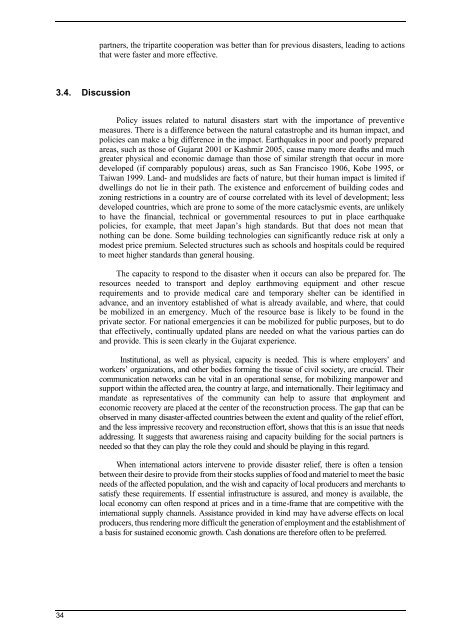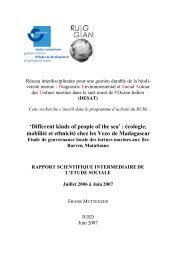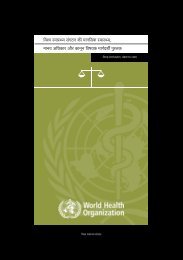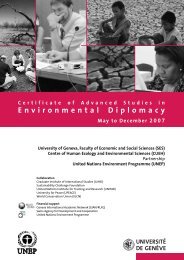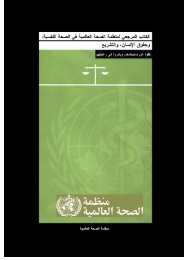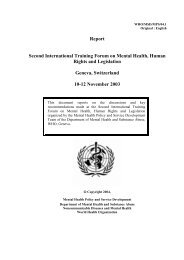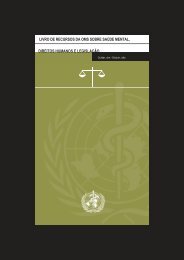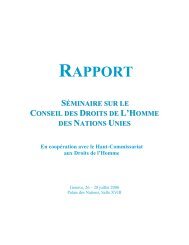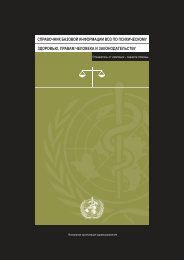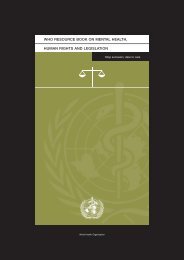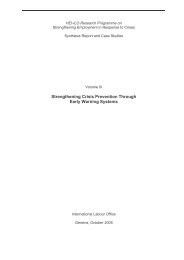Volume 1 Cedric - revised luca Final - RUIG-GIAN
Volume 1 Cedric - revised luca Final - RUIG-GIAN
Volume 1 Cedric - revised luca Final - RUIG-GIAN
Create successful ePaper yourself
Turn your PDF publications into a flip-book with our unique Google optimized e-Paper software.
partners, the tripartite cooperation was better than for previous disasters, leading to actionsthat were faster and more effective.3.4. DiscussionPolicy issues related to natural disasters start with the importance of preventivemeasures. There is a difference between the natural catastrophe and its human impact, andpolicies can make a big difference in the impact. Earthquakes in poor and poorly preparedareas, such as those of Gujarat 2001 or Kashmir 2005, cause many more deaths and muchgreater physical and economic damage than those of similar strength that occur in moredeveloped (if comparably populous) areas, such as San Francisco 1906, Kobe 1995, orTaiwan 1999. Land- and mudslides are facts of nature, but their human impact is limited ifdwellings do not lie in their path. The existence and enforcement of building codes andzoning restrictions in a country are of course correlated with its level of development; lessdeveloped countries, which are prone to some of the more cataclysmic events, are unlikelyto have the financial, technical or governmental resources to put in place earthquakepolicies, for example, that meet Japan’s high standards. But that does not mean thatnothing can be done. Some building technologies can significantly reduce risk at only amodest price premium. Selected structures such as schools and hospitals could be requiredto meet higher standards than general housing.The capacity to respond to the disaster when it occurs can also be prepared for. Theresources needed to transport and deploy earthmoving equipment and other rescuerequirements and to provide medical care and temporary shelter can be identified inadvance, and an inventory established of what is already available, and where, that couldbe mobilized in an emergency. Much of the resource base is likely to be found in theprivate sector. For national emergencies it can be mobilized for public purposes, but to dothat effectively, continually updated plans are needed on what the various parties can doand provide. This is seen clearly in the Gujarat experience.Institutional, as well as physical, capacity is needed. This is where employers’ andworkers’ organizations, and other bodies forming the tissue of civil society, are crucial. Theircommunication networks can be vital in an operational sense, for mobilizing manpower andsupport within the affected area, the country at large, and internationally. Their legitimacy andmandate as representatives of the community can help to assure that employment andeconomic recovery are placed at the center of the reconstruction process. The gap that can beobserved in many disaster-affected countries between the extent and quality of the relief effort,and the less impressive recovery and reconstruction effort, shows that this is an issue that needsaddressing. It suggests that awareness raising and capacity building for the social partners isneeded so that they can play the role they could and should be playing in this regard.When international actors intervene to provide disaster relief, there is often a tensionbetween their desire to provide from their stocks supplies of food and materiel to meet the basicneeds of the affected population, and the wish and capacity of local producers and merchants tosatisfy these requirements. If essential infrastructure is assured, and money is available, thelocal economy can often respond at prices and in a time-frame that are competitive with theinternational supply channels. Assistance provided in kind may have adverse effects on localproducers, thus rendering more difficult the generation of employment and the establishment ofa basis for sustained economic growth. Cash donations are therefore often to be preferred.34


